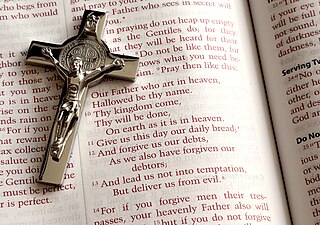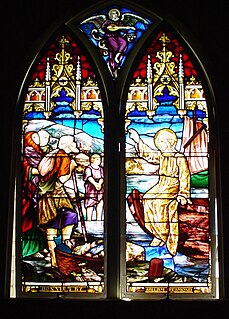Related Research Articles

Matthew 3:9 is the ninth verse of the third chapter of the Gospel of Matthew in the New Testament. The verse describes an incident where John the Baptist berates the Pharisees and Sadducees. He has previously called them a brood of vipers and warned them of the wrath to come and has urged them to repent. In this verse he warns that their links to Abraham will not save them.

Matthew 3:11 is the eleventh verse of the third chapter of the Gospel of Matthew in the New Testament. The verse occurs in the section relating the preachings of John the Baptist. In this verse he predicts that he will be followed by someone much greater than himself. The main theme of this verse is that John will soon be supplanted by a much greater figure and that John's water baptism is just a preparation for the much greater baptism by fire and spirit that will occur under the second coming of the Christian messiah Jesus, an original Christian concept that, according to Jewish scholars, lacks any fundament in the Hebrew scripture.

Matthew 5:22 is the twenty-second verse of the fifth chapter of the Gospel of Matthew in the New Testament and is part of the Sermon on the Mount. It is the first of what have traditionally been known as the 6 Antitheses. In this one, Jesus compares the current interpretation of "You shall not murder" from the Ten Commandments with his own interpretation.

Matthew 6:14–15 are the fourteenth and fifteenth verses of the sixth chapter of the Gospel of Matthew in the New Testament and is part of the Sermon on the Mount. These verses come just after the Lord's Prayer and explain one of the statements in that prayer.

Matthew 7:2 is the second verse of the seventh chapter of the Gospel of Matthew in the New Testament and is part of the Sermon on the Mount. This verse continues the discussion of judgmentalism.
Matthew 11:11 is a verse in the eleventh chapter of the Gospel of Matthew in the New Testament.
Matthew 10:23 is a verse in the ninth chapter of the Gospel of Matthew in the New Testament.

Matthew 7:22 is the twenty-second verse of the seventh chapter of the Gospel of Matthew in the New Testament and is part of the Sermon on the Mount. This verse continues Jesus' warning against false prophets.
Matthew 9:13 is a verse in the ninth chapter of the Gospel of Matthew in the New Testament.

Matthew 10:3 is the third verse in the ninth chapter of the Gospel of Matthew in the New Testament.
Matthew 9:22 is a verse in the ninth chapter of the Gospel of Matthew in the New Testament.

Matthew 9:25 is the 25th verse in the ninth chapter of the Gospel of Matthew in the New Testament.
Matthew 11:21 is a verse in the eleventh chapter of the Gospel of Matthew in the New Testament.
Matthew 9:34 is a verse in the ninth chapter of the Gospel of Matthew in the New Testament.

Matthew 10:14 is the fourteenth verse in the ninth chapter of the Gospel of Matthew in the New Testament.

Matthew 10:15 is the fifteenth verse in the ninth chapter of the Gospel of Matthew in the New Testament.
Matthew 10:16 is a verse in the ninth chapter of the Gospel of Matthew in the New Testament.

Matthew 10:27 is the 27th verse in the ninth chapter of the Gospel of Matthew in the New Testament.
General judgment is the Christian theological concept of a judgment of the dead. When the individual dies, general judgment holds that the person's final dispensation will await the general judgment of the dead at the end of the world, rather than be judged immediately. It is generally contrasted with a particular judgment right after death. It is related closely to Judgment Day and often is just another phrase for the Last Judgment or Final Judgement.

Matthew's gospel and Luke's gospel record Jesus' message of woe to the unrepentant cities of Chorazin, Bethsaida and Capernaum, located around the northern shore of the Sea of Galilee, for their refusal to repent.
References
- ↑ Robert Witham, Annotations on the New Testament of Jesus Christ. Dublin: 1730.
- 1 2 3 4 5 6 7 "Catena aurea: commentary on the four Gospels, collected out of the works of the Fathers: Volume 6, St. John. Oxford: Parker, 1874. Thomas Aquinas".
 This article incorporates text from this source, which is in the public domain.
This article incorporates text from this source, which is in the public domain.